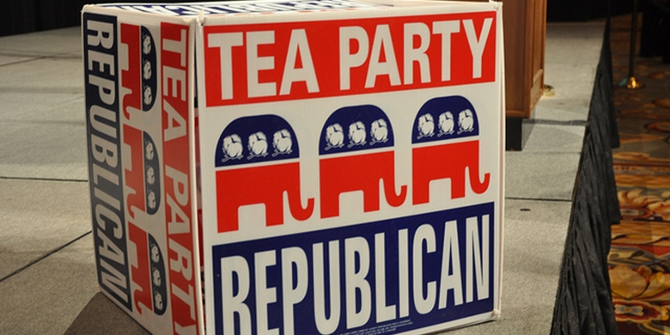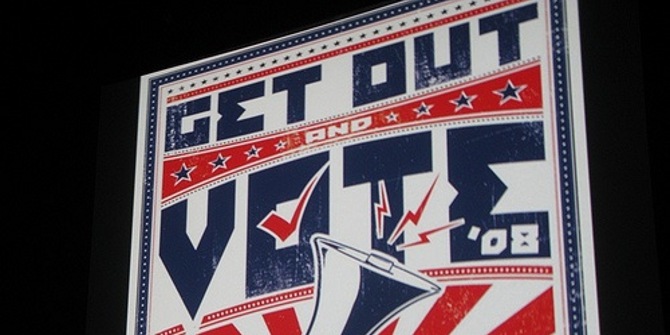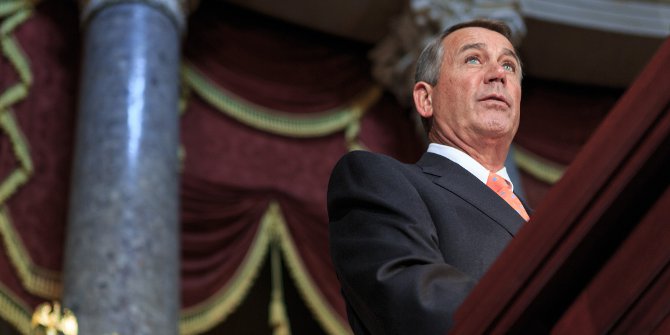 Will Trump be able to achieve his policy agenda when he becomes president? Mara Suttmann-Lea writes that presidents are typically able to rely on their reputation, public prestige and powers of persuasion to get things done. While Trump may be able to use his powers of persuasion – in combination with loyalty based appointments – to advance his agenda, his position as an outsider within his own party may prove to be a major stumbling block.
Will Trump be able to achieve his policy agenda when he becomes president? Mara Suttmann-Lea writes that presidents are typically able to rely on their reputation, public prestige and powers of persuasion to get things done. While Trump may be able to use his powers of persuasion – in combination with loyalty based appointments – to advance his agenda, his position as an outsider within his own party may prove to be a major stumbling block.
The months following Donald Trump’s upset victory over Hillary Clinton in the 2016 presidential elections have seen no shortage of speculation over the extent to which he’ll be able to push forward his initiatives and establish a legacy as a successful president. Throughout this election year, political scientists specializing in the American Presidency have provided a useful lens through which to analyze the prospects for success in a Trump presidency. Using the theoretical frameworks of political scientists Richard Neustadt, Terry Moe, and Stephen Skowronek, I examine the resources, institutions, and contexts that may help or hinder the advancement of a coherent policy agenda and establishment of a successful presidential legacy under the Trump administration.
Richard Neustadt, the founding father of modern presidential scholarship in political science, contends presidents are most powerful not when giving direct orders, but when they are able to persuade others that his intentions are also in their own best interests. Facing a constitutional system that inherently limits presidential power, American presidents must be persuasive within the confines of that system to achieve policy goals. Such persuasion rests on two primary resources. First and foremost, it rests on a president’s reputation as an effective politician. Second, it rests on their standing with the public. Reputation is most important according to Neustadt, but having high public prestige can help indirectly bolster a president’s reputation as a winner. Combined, these attributes allow presidents to be more persuasive and build capital for policy negotiations down the road.
Coming into office, Trump scores quite low on these measures. He has no calculable reputation in terms of his political accomplishments because he has never held office. Still, if one expands the Neustadtian framework to consider Trump’s reputation as a businessman, he has demonstrated exceptional prowess in branding himself as a winner, a trait that bolstered his credibility during the election. To the extent that he can carry this persona into the Oval Office, he may have some startup capital to build a reputation as a politician who can get things done and improve his bargaining position for policy negotiations. But given what we know about Trump’s leadership style within his businesses and his presidential campaign, he reads less as a persuasive wheeler and dealer and more as a hard handed leader not particularly willing to seek out advice or to compromise when making deals.
Trump, the persuader-in-chief?
Nevertheless, Trump has been known to use a type of persuasion that, while not necessarily in line with the Neustadtian framework, may nevertheless have potential. In business dealings and his campaign organization, he has proven adept at getting what he wants not by convincing others that his interests are also in their interests, but by promoting rivalries while maintaining a close circle of loyalists. One Republican strategist noted , “He’s always the man in charge. From his people, he gets what he needs. He makes them compete. Sometimes it gets the juices flowing, sometimes it spurs conflict.” Time will tell if this Machiavellian persuasion will be an advantage for Trump once he takes office.
Public prestige, though secondary to reputation in Neustadt’s framework, remains a more problematic thorn in Trump’s side. His low approval ratings coming into office and substantial loss in the popular vote means he has an uphill climb to gain favor and legitimacy in the eyes of the broader public. It may be some time before Trump is able to wield public prestige as a meaningful bargaining tool in long-term policy debates. In today’s highly polarized, individualized politics where the public expects a great deal from their president, public prestige may carry equal, if not more weight than professional reputation.

Scholars writing after Neustadt have criticized his individualized approach to the presidency, relying more on the institutions and contexts that surround the president to identify resources and opportunities for success. Terry Moe agrees with Neustadt that the American system of governance obstructs presidential leadership. However, he argues that presidential power depends less on individual idiosyncrasies, and more on how a president wields institutional resources. To exercise power, presidents don’t persuade. They bulldoze, firing people where they can and using politicization, the appointment of loyal and ideologically compatible people to pivotal positions, and centralization, housing key agencies and positions within the executive branch to manage the federal government.
Thus far, Trump doesn’t appear to be relying wholesale on loyalty-based appointments. In his cabinet appointments, he has shown some interest in politicization, appointing a few “loyalists” to key positions. But Trump has to balance his outsider status with conventional Republican norms; if he relies purely on outsider appointments based on personal loyalties, he risks a less competent administration unable to deal with the complexities and sophistication of modern government. If he relies solely on the Republican establishment for his appointments, he loses his luster as an outsider. At this point, Trump looks to be striking a balance between these two extremes. He isn’t simply writing a blank check for individuals who were arguably the most loyal to him during his run for the presidency, like Rudy Giuliani and Chris Christie. Instead, he’s nominated many establishment characters to most of the positions that require confirmation, and gathered a crew of outsider loyalists for non-confirmation appointments. There are exceptions, of course. Rex Tillerson’s nomination for Secretary of State for example, is raising eyebrows, and Trump is pushing establishment Republicans to fall in line behind his choice.
Trump’s persuasive abilities and appointment decisions may matter less, however, given the schisms in today’s Republican Party and the context in which he is arriving in office. Stephen Skowronek makes a much more deterministic argument to explain presidential success, contending it is contingent on the strength of the dominant party’s coalition when a president takes office and where he sits relative to that party.
The current dominant party regime, ushered in by the election of Ronald Reagan, appears to be crumbling. Trump may have campaigned on a rhetorical repudiation of the Obama presidency, but his populist message also resonated with a growing number of Americans who no longer see the predominant governing solutions ushered in by Reagan as effective. Though paying lip-service to a few staples of the Republican party platform (for example, his stance on abortion and gun control), he remains largely an enigma in terms of his true ideological commitments.
Trump the disjunctive president
Thus, Trump is entering office as the de facto leader of a fracturing party and at the same time out of step with that party, a scenario ripe for a disjunctive presidency in Skowronek’s typology. Historically, disjunctive presidents have not achieved long-term success, and are often relegated to one term. Because of factions within his own party and his position as an outsider, this type of president is unable to carry out his party’s policies nor effectively establish his own legacy. As a political outsider, Trump lines up with other disjunctive presidents in Skowronek’s typology, for example: Jimmy Carter, an engineer by trade, and Herbert Hoover, a self-made millionaire branded as a problem solver.
If truly a disjunctive president, this means the possibility of success, both in terms of policy achievements and the prospects for a second term are dim for the incoming president. Trump can’t simply fall in step with establishment Republicans because these approaches are increasingly seen as outmoded by many Americans. Trump’s populist-style support amongst blue-collar workers is evidence of this. He also can’t adopt liberal solutions without alienating needed allies within the Republican Party.
The voters who elected Trump are looking for something wholly unorthodox, a departure from the previous 30 or so years. Trump can present himself as such rhetorically, but his simultaneous alignment with the dominant party coalition makes the realization of this unorthodoxy in actual policy achievements and a broader transformation unlikely. As political scientist Chris Baylor wrote earlier this year in his own application of Skowronek’s framework to a potential Trump presidency, “Disjunctive presidents win no friends among the other party, while provoking cries of treachery from their own.”
Still, perhaps more so than at the beginning of any other presidency in the modern era, we can’t predict with any degree of certainty how successful a Trump presidency will be. He is a true outsider, having never held elected office or served in the military. Trump is a man who abhors loss and humiliation, quoted as saying “I’ve never had a failure, because I always turn failure into success.” He has promised a sweeping transformation of government, making lavish promises that are likely not feasible given the constitutional constraints of the presidency. This is a high bar to set for a man not conditioned to losing. Of course, this paradox is not so much idiosyncratic to Trump himself, but is a fundamental characteristic of the modern presidency: the public expects their presidents to deliver and be transformative, but they are up against a system that is biased against them, one that favors the status quo, incremental change, and compromise as a means to move agendas forward. Still, Trump is a wholly unique president, cut from an entirely different cloth. Until he’s had some time in office, it’s not clear how Trump will handle this system and how the system will handle him.
Featured image credit: By Caleb Smith; Office of the Speaker of the House [Public domain], via Wikimedia Commons
Please read our comments policy before commenting.
Note: This article gives the views of the author, and not the position of USAPP– American Politics and Policy, nor of the London School of Economics.
Shortened URL for this post: http://bit.ly/2ig3fFA
_________________________________________
 Mara Suttmann-Lea – Northwestern University
Mara Suttmann-Lea – Northwestern University
Mara Suttmann-Lea is a PhD Candidate in political science at Northwestern University. Her research is situated at the intersection of state and local electoral institutions, campaigns, political participation, and American political development. Her substantive focus is on how the responses of political actors to changes in election laws can have unintended consequences for American political behavior and institutions.






